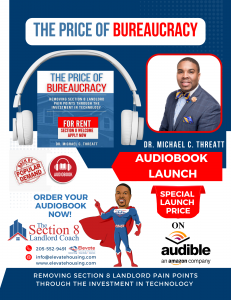Dr. Michael C. Threatt, The Section 8 Landlord Coach™ appointed as the new Alabama At-Large Board Member for SERSHA
Dr. Michael C. Threatt-The Section 8 Landlord Coach™ appointed as the new Alabama At-Large Board Member for the SouthEast Regional Section 8 Housing Association
Ready-to-Rent (R2R) Certified Renters
The Golden Ticket Section 8 rental housing challenge is a part of the larger affordable housing crisis. For example, before the COVID-19 pandemic, if a PHA wanted to lease up 25 units, the PHA would have to issue 100 vouchers to be successful, which creates a 4-to-1 ratio. Post-COVID-19, if that same PHA wanted to lease up 25 units, that same PHA would have to issue 200 vouchers to be successful, which now creates an 8-to-1 ratio. The competition to find an able and willing landlord to accept the Section 8 Program is daunting, where one (1) in seven (7) Section 8 voucher holders are underutilized because of the lack of landlords.
Sometimes, landlords are afraid to rent to Section 8 voucher holders because of the stigmas and stereotypes surrounding bad tenancy that are sometimes linked to the Section 8 Program. As Dothan Housing’s COO, he has incorporated ready-to-rent (R2R) education into its Section 8 Program. He credits the success of the R2R education to its founder, Ms. Raina Evans, who has opened the door to housing opportunities through housing education. The monetary incentives combined with the newly branded “Certified Renter” is an additional landlord incentive that has enhanced the guaranteed rent of the Section 8 Program for landlord risk analysis.
Landlord Education
Landlords often blindly enter the Section 8 Program and have little to no knowledge of how it works. Unfortunately, one of the biggest misconceptions about the Section 8 Program for landlords is that the PHA is the landlord's property manager. Likewise, the landlord assumes that the PHA enforces the lease and that all the landlord has to do is sit back and be ready to receive their HAP payment.
In the Section 8 Program, knowledge is power; the more education a landlord has, the more power the landlord has in making informed business decisions. Many landlords are inexperienced in property management, and landlord training would be helpful to clarify the PHA's and landlord's roles related to property management and voucher management. The best practice for landlords participating in the Section 8 Program is to be educated about the landlord's role as the property manager or rental housing owner related to the lease, between them and the voucher holder, and the HAP contract between the landlord and the PHA.
Furthermore, landlords feel that they gleaned more from landlord education workshops, such as property management workshops facilitated by real estate professionals than the landlord orientations and seminars facilitated by the PHA's Section 8 Program staff. Therefore, in addition to the existing orientation, ongoing training should be provided to landlords to ensure a full understanding of the related processes associated with participating in the Section 8 Program.
If landlords have the proper education, they will reduce potential losses, eliminate unnecessary trouble, and take full advantage of the many benefits they can obtain from participating in the Section 8 Program. Landlords must understand that there is much more to renting their property than just finding a tenant and collecting the monthly rent for their unit; they must also be aware of housing discrimination issues, lease enforcement, court proceedings, security deposit laws, damage claims, personal injury claims and much more.
When landlords are educated with the facts about the Section 8 Program, they can avoid many problems and pitfalls that some landlords encounter. Landlords make mistakes and cause problems for themselves and their tenants because, more often than not, they do not know their legal rights and obligations under the Section 8 Program nor their respective state tenant-landlord laws. Also, landlords fail to learn the local PHA policies and procedures. Many ‘small mom-and-pop’ landlords and real estate investors have few rental properties and are considered amateurs in real estate transactions.
A basic understanding of the Section 8 Program’s rules and regulations, the PHA administrative plan policy, and their state tenant-landlords’ laws would be beneficial to being a successful landlord. To succeed as a landlord, an owner must learn top-notch property management techniques to manage their properties to generate maximum profit. Being a successful landlord in the Section 8 Program can be challenging work, but if done correctly, it can be very profitable for a landlord.
However, a few differences exist between renting to a family under the Section 8 Program and a private market renter in the open market. If landlords have the proper information, they will be appropriately prepared to work more effectively with PHA staff and be successful as a landlords in the Section 8 Program. Whether a landlord owns one unit or one thousand rental units, rents to Section 8 Program voucher holders, or is a private market tenant, the landlord must treat renting as a business because being a landlord is just that, a business. A landlord who participates in the Section 8 Program is allowed and is expected to operate the same way as a landlord in the private rental market.
Landlords are strongly recommended and encouraged to stay abreast of changes in the updated Section 8 Program rules and regulations. That’s why it is paramount that landlords learn the PHA policies and procedures before entering into a Housing Assistance Payment (HAP) contract. The administrative plan is pretty much the local PHA’s bible, spelling out how the PHA administers its Section 8 Program. It is also somewhat like an operational manual explaining the PHA’s discretionary policies and procedures.
Dr. Michael C. Threatt
Elevate Housing Solutions, LLC
+1 205-552-9491
email us here
Visit us on social media:
Facebook
Twitter
LinkedIn
Instagram
Affordable Housing Documentary featuring Dr. Michael C. Threatt
Legal Disclaimer:
EIN Presswire provides this news content "as is" without warranty of any kind. We do not accept any responsibility or liability for the accuracy, content, images, videos, licenses, completeness, legality, or reliability of the information contained in this article. If you have any complaints or copyright issues related to this article, kindly contact the author above.



